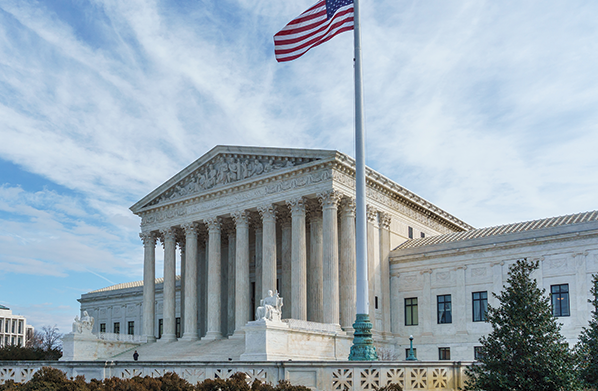An Asian-American band called The Slants won the support of the Supreme Court to have their name trademarked. The ruling this week by the Court will have wide-reaching implications for sports teams, organizations, and groups whose names are considered hateful.
As we reported in January, the rock band wanted to reclaim the racial slur that refers to a facial feature of Asian people and asked the federal government for trademark protection of its name. The founder noted earlier this year:
"We grew up and the notion of having slanted eyes was always considered a negative thing," Tam said in January. "Kids would pull their eyes back in a slant-eyed gesture to make fun of us. … I wanted to change it to something that was powerful, something that was considered beautiful or a point of pride instead."
The Patent and Trademark Office (PTO) rejected the trademark application pointing to federal law that prohibits the registration of trademarks that disparage or paint a people with contempt.
The Supreme Court shut down the government in a unanimous decision and struck down the federal law on free speech grounds. This is a major decision and victory for free speech – even the speech we find offensive.
Justice Samuel Alito delivered the Court’s opinion finding:
The disparagement clause violates the First Amendment’s Free Speech Clause. Contrary to the Government’s contention, trademarks are private, not government speech. Because the “Free Speech Clause . . . does not regulate government speech,” Pleasant Grove City v. Summum, 555 U. S. 460, 467, the government is not required to maintain viewpoint neutrality on its own speech. This Court exercises great caution in extending its government-speech precedents, for if private speech could be passed off as government speech by simply affixing a government seal of approval, government could silence or muffle the expression of disfavored viewpoints.
The Federal Government does not dream up the trademarks registered by the PTO. Except as required by §1052(a), an examiner may not reject a mark based on the viewpoint that it appears to express… And once a mark is registered, the PTO is not authorized to remove it from the register unless a party moves for cancellation, the registration expires, or the Federal Trade Commission initiates proceedings based on certain grounds… And none of this Court’s government-speech cases supports the idea that registered trademarks are government speech.
We takeaway a few things from the Court’s decision:
(1) The government doesn’t retain the right to judge what trademarks are offensive or not.
(2) By registering a trademark, it does not mean the mark becomes the government’s speech. Trademarks are private. The government blesses applicants with intellectual property protections, but that is it.
(3) The Court upholds the First Amendment free speech principle over offense. We may not like what someone calls themselves, we may even find it offensive, but offense is not grounds for censorship. As Justice Alito said, “We have said time and time again that the ‘public expression of ideas may not be prohibited merely because the ideas are themselves offensive to some of their hearers.’”
In a culture that evolves so quickly, the fundamental protection of free speech rights should be celebrated by those on the right and left. NPR reports that the American Civil Liberties Union is welcoming the Supreme Court's decision:
"The government's misguided effort to protect minorities from disparagement instead hurt members of that very community by hindering their right to compete in the marketplace of ideas. Fortunately, today's opinion prevents the kind of absurd outcome that results when the government plays speech police."
Not surprisingly, many are concerned that this will open the floodgate of trademark applications for offensive names. However, for organizations and groups that have been grappling with trademark registration denials, this decision is good news. The Washington Redskins football team for example, may get to keep its trademarked name.
We're glad to see the Court come down in support of free speech. Upholding this right, even for language we find offensive, is our only protection against the whims of culture.


